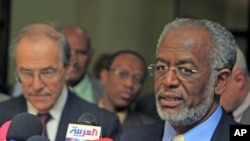The U.S. Special Envoy to Sudan says Khartoum’s belligerent actions are threatening delicate negotiations on border issues and revenue sharing ahead of the South’s independence next month. Our correspondent in Addis Ababa reports hopes are rising for an easing of tension as diplomatic activity intensifies over the next few days.
Tens of thousands of people are reported fleeing heavy fighting along the undefined border between north and south Sudan. Southern officials Friday accused Khartoum’s military of bombing a border village, and the United Nations told of rapidly deteriorating conditions in South Kordofan State, with civilians trapped between warring factions.
A U.N. spokesman estimates 146,000 people have been forced to flee since Sudanese army troops captured the main town in the disputed Abyei region last month.
An African Union (AU) High Level Panel led by former South African President Thabo Mbeki is shuttling between capitals in an attempt to ease rising tensions. He met Thursday in Khartoum with Sudanese President Omar Hassan al-Bashir and flew Friday to Juba for talks with Southern leader Salva Kiir.
U.S. Special Envoy to Sudan Princeton Lyman says the military takeover of Abyei has enormously complicated negotiations on sensitive issues hanging over the South’s July 9th independence. He told VOA much of the talk is focused on how to reverse the Abyei takeover so talks on other issues could resume.
"The government in Khartoum seems to have taken a more belligerent and proactive military approach to the situation, perhaps thinking this gives them some advantages in the negotiations, first by the military takeover in Abyei and then by sending forces into South Kordofan," said Lyman. "I’m not sure why the government chose in the last few weeks to turn to this kind of a policy, but it is very, very threatening to the whole negotiating process."
Diplomatic efforts are due to be ratcheted up a notch in coming days. AU Panel chief Mbeki is reported to be returning to Addis Ababa, which has served as a neutral site for north-south negotiations.
U.S. Secretary of State Hillary Clinton is also due in the Ethiopian capital Monday, and diplomats involved in the arrangements say she would meet Mr. Mbeki and senior officials, possibly including Sudanese Vice-President Osman Ali Taha and Southern Sudanese leader Salva Kiir.
Special Envoy Lyman acknowledged Secretary Clinton’s deep concern about events in Sudan and confirmed she would hold talks on the subject. But he said details of her schedule have not been finalized.
"I can’t predict what will be the outcome," he said. "Her visit is very important as are other discussions going on. We’ll have to see how it works out in the next few days."
Despite the current flare up, the veteran U.S. diplomat expressed cautious optimism that northern and southern leaders would reach a peaceful settlement of their disputes before the July 9th independence day. He said, “of course they can work it out, because both sides realize that if they really go back to war, they’re going to suffer greatly”.
The south’s independence is one of the final planks of a 2005 Comprehensive Peace Agreement that ended decades of civil war between the Arab-dominated north and the ethnically black south.
US Sudan Envoy Says Khartoum’s Belligerence Threatens North-South Talks




